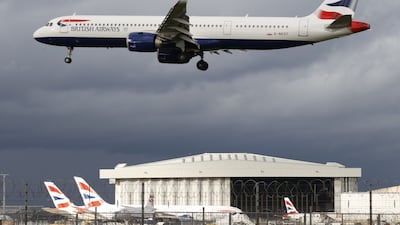British Airways has confirmed it will fly planes using sustainable aviation fuel (SAF) from early next year.
The airline will become the first to use lower carbon alternatives produced in the UK, derived from waste fat, oil and grease, on a commercial scales.
BA has agreed to purchase enough of the fuel to reduce its life cycle CO2 emissions by nearly 100,000 tonnes, enough to power 700 net-zero flights between London and New York.
SAF production reduces carbon emissions by about 80 per cent compared with traditional jet fuel but it is more expensive. In theory, SAF can be blended with traditional fuel at up to 50 per cent to power planes.
The airline will use fuel produced at Phillips 66’s Humber Refinery in Lincolnshire, England, to power its aircraft on short and long-haul flights.
Anne-Marie Trevelyan, the UK’s International Trade Secretary, said it was “exciting to see business-led delivery” to meet Britain’s net-zero strategy.
Her fellow Conservative MP Royston Smith said it would pave the way for “cleaner, greener air travel”.
BA chief executive Sean Doyle said the agreement with Phillips 66 was an “important step on our journey” to reaching net-zero carbon emissions by 2050 and powering 10 per cent of flights with SAF by 2030.
“The UK has the resources and capabilities to be a global leader in the development of SAF and scaling up the production of SAF requires a truly collaborative approach between industry and government,” he said.
“We are excited to develop our relationship with Phillips 66 Limited further with a view to growing production capacity and using a wider range of sustainable waste feedstocks to supply our future flights.
“The development of sustainable aviation fuel is a major focus for us and forms part of our commitment to achieving net-zero carbon emissions by 2050 through a series of short, medium and long-term initiatives.”
In November, BA operated its first flight using sustainable fuel from London Heathrow to Glasgow to coincide with Cop26, the United Nations climate summit held in the Scottish city.
The airline said the flight demonstrated how “aviation is decarbonising”.
Humber Refinery general manager Darren Cunningham said BA’s announcement demonstrates “the importance the aviation and energy industries are placing on sustainability”.
“The Humber Refinery was the first in the UK to co-process waste oils to produce renewable fuels and now we will be the first to produce SAF at scale, and we are delighted British Airways is our first UK customer,” he said.
“We’re currently refining almost half a million litres of sustainable waste feedstocks a day and this is just a start.
“Markets for lower-carbon products are growing and this agreement demonstrates our ability to supply them.”
It comes after IAG, the owner of BA, threatened to cut flights from Heathrow Airport over a continuing row about rising passenger fees.
Under a decision made by the Civil Aviation Authority, the price for each passenger could jump by 56 per cent by 2023, from £22 to £34.50. Airlines have issued a warning that rising fees would be passed on to customers in fare prices.


